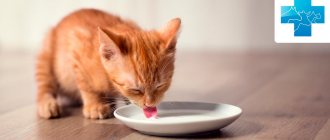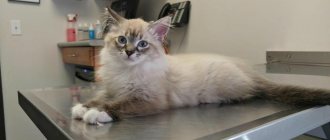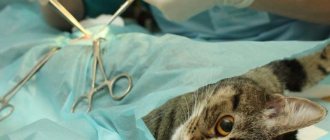Do cats eat eggs?
When feeding cats, be guided by what these animals consume in the wild.
The cat is a predator whose diet is based on small rodents, amphibians and birds. From time to time, cats also eat eggs, climbing trees and destroying bird nests. Therefore, the cat can be fed with them, but in moderation. They are given to small kittens from 2-3 months of age. Unlike a dog or a human, a cat is a classic predator that has not developed omnivory. Therefore, pets must be fed mainly animal proteins (proteins). First of all, this includes meat. But since it is expensive, you can buy meat by-products: heart, kidneys, tripe, intestines, lungs and internal organs. However, even in this case, the daily ration will remain quite expensive.
If the owners’ income is limited, then veterinarians in this case recommend changing part of the menu to eggs. Firstly, this product contains many animal proteins and valuable amino acids, which is beneficial for animals. Secondly, cats in the wild eat eggs and digest them well, so there is definitely no harm from them.
Quail or chicken?
Quail eggs have become fashionable. They are recommended to everyone: both people and animals. How is it really? Let's look at popular myths.
1. Quail is healthier than chicken.
True, but there is almost no difference. If you are choosing between homemade chicken and store-bought quail, then choose the first. It's good if your friends or you have your own small farm. You will know for sure that the birds are healthy.
2. It is better to give cats quail eggs.
This is also true, but you shouldn’t deify the product too much. Quails are digested a little better. This is where the benefits end.
3. Quails cannot carry salmonella.
Myth. Don't trust cunning marketers. Only heat treatment will help prevent the disease.
4. Quail are hypoallergenic.
Myth. The product may well cause individual intolerance. It usually occurs after eating a large number of eggs one time. You can keep purr safe by limiting portions.
The only undeniable advantage of quails is their size. If your cat is suddenly not in the mood, you will put less food in the trash.
Composition and benefits of eggs
Proteins are large and long molecules (thread-like) that are made up of amino acids, they are usually twisted or crumpled, which is why they take up less space. In structure, proteins can be compared to strings of beads. In such an association, the chain itself will be a protein, and the beads will be amino acids. There are many of them, including lysine, tryptophan, methionine and other compounds.
Egg white is the building material for the chick, so it contains all the necessary amino acids that must be involved in the creation of a living organism. This is why eggs are so beneficial for cats. They contain a lot of components that improve the condition of fur, claws, and teeth. Periodic feeding with eggs reduces the likelihood of developing cardiovascular diseases, strengthens the immune system and delays old age.
Eggs include phosphorus, calcium, sodium, potassium, iron and magnesium. These are the most essential microelements that are responsible for the health of bones, teeth, blood vessels, nervous and muscle tissue. In addition, regular intake of these elements reduces the risk of developing hormonal and intestinal diseases, improves the condition of the skin and coat.
This product is especially rich in vitamins B1, B2, B6, B12, A, PP. One chicken egg replenishes one third of an adult pet’s daily requirement for vitamins. Carotene is responsible for the condition of the eyes, their normal development and vision. B vitamins regulate hair growth, the formation of proteins in the body, and the activity of the immune, hematopoietic, nervous and muscular systems.
How often?
Although a food product is very healthy, this does not mean that it should be given to the animal often; variety is very important in nutrition. It is enough to give your cat eggs 2-3 times a week , but not whole eggs, but in fractions. That is, one egg should be divided into three meals. An adult cat can be offered one egg per week, but small kittens should not be given it until they get used to cottage cheese and meat, that is, it is necessary to try it for the first time when the animals are 3 months old. You can also offer quail eggs to animals; they contain less cholesterol and are therefore considered more healthy.
Dangers of Feeding Eggs
There is a dangerous myth that eggshells are immune and protect the contents from bacteria. This is partly true, the surface of the egg is indeed populated by bacteria, but they are not specific immune cells. These are the same microorganisms that live on the surface of the skin of adult birds. They create an environment unfavorable for some fungi and bacteria, but this is not a reliable protective barrier.
The myth that eggshells are impenetrable is also incorrect. Some parasites and microbes can penetrate through this barrier. The most dangerous and common pathogen is salmonellosis. For these reasons, you can feed your pet only store-bought eggs that come from laying hens that undergo regular veterinary examinations.
Eggs from your own household farm should be given only after thorough boiling, which is guaranteed to destroy all dangerous bacteria. This also applies to quail eggs. All stories that quail are resistant to salmonellosis are a myth. This type of bird is no different from chickens in terms of resistance to the pathogen.
How to train a cat to eat eggs
Cats often eat eggs with pleasure, guided by instincts. But it happens that some individuals do not like this product, then the owner has to resort to some tricks.
A boiled egg can be added to your usual diet in finely chopped form. And since it is recommended to eat a small amount of egg at one meal, the cat may not pay attention to its presence on the menu.
If your pet is used to eating store-bought food, study its composition: many manufacturers add eggs to the finished product. Otherwise, you can add a little boiled egg to dry food or canned food.
So, a small amount of chicken or quail eggs will not harm the cat unless there are medical contraindications for this. If in doubt, it is better to consult a veterinarian and undergo the necessary tests. Then you will be confident that you are ensuring the well-being and health of your pet.
Contraindications
Contraindications mainly include allergies, but an allergic reaction to eggs is extremely rare. Signs of egg protein intolerance include vomiting and diarrhea. It is not worth giving raw eggs to kittens until they are six months old, since in this form the protein is not very well absorbed; it is better to cook them before giving them to them.
Protein is contraindicated in case of urate and oxalate kidney stones, but in this case the pet can be fed the yolk. With phosphates and struvite, on the contrary, the yolk is allowed, but the protein must be excluded from the diet. Of course, measures can be taken after establishing the acidity of urine and the nature of urinary stones.
Do you need to cook?
A good option is to offer your pet boiled eggs . They can be mixed with meat or cottage cheese if he refuses the product in its “pure” form. It is not recommended to give fried eggs in oil to cats. The best option would be to pamper your cat with a steamed omelette without adding salt. To make it fluffy and tasty, add warmed milk while whipping.
Under no circumstances should cats be offered raw eggs! They may contain E. coli, which will lead to inflammation of the pancreas. In their raw form, they are very poorly digestible. Crude protein can remove a number of vitamins from the body, and leads to their deficiency, even if the cat’s nutrition is complete. Raw yolk is considered healthy, but only from homemade and fresh eggs.
Important! Quails should also not be offered raw to cats, because there may be bacteria on the shell and inside that can lead to very dangerous diseases.
Boiled eggs are no less dangerous for animals than raw eggs. They need to be cooked for at least four minutes, because the causative agents of salmonellosis die only at high temperatures. In this case, you can be sure that your pet will eat a safe product that will not cause any harm.
How to collect cat paws
Only the above-ground part of this herb can be used for medicinal purposes. Its collection is carried out taking into account the timing of flowering and ripening. As already mentioned, it usually blooms in mid-May and continues to bloom until the end of July, while its fruits appear in July-August.
The stems, leaves, and flower baskets, which can only be collected during flowering, have medicinal properties. If you couldn’t keep the basket intact, you can dry individual flowers. As a rule, medicinal raw materials are dried naturally in the fresh air. But it is necessary to equip a small canopy for this. The shelf life of this raw material is short, only a year.
Another thing is the above-ground part, collected before the flowers bloom. Such stems, leaves and buds contain all useful substances in higher concentrations. The medicinal raw materials are dried under canopies, as in the first case. But it can be safely stored for 3 years.
You can only collect the grass itself, that is, stems and leaves, without buds, baskets or flowers. Such raw materials are collected until the buds open. Dry it outdoors in the shade or indoors (the main thing is that it is well ventilated). The shelf life of raw materials is 1 year. In general, it is better to store such herbs in paper or fabric bags or cardboard boxes pre-lined with paper.
Egg dishes
Pets enjoy eating steamed omelettes. You need to add a little milk to the egg. Spices are not added to the dish. Fat is also contraindicated.
Boiled eggs are healthy, nutritious, and desirable on a cat’s menu. They can be served along with porridges and vegetable purees. But you should avoid fried eggs. They do not benefit the animal's body.
In what form can you give eggs to a kitten?
You can give kittens both chicken and quail eggs. The latter are considered more useful because they contain less cholesterol, are more nutritious and are easier to digest by the body. Pregnant and lactating females should be given any eggs with caution, as they can negatively affect the offspring.
To avoid harm to the kittens, giving raw eggs is strictly prohibited! The raw product may contain salmonella. Kittens aged 1-2 months are especially susceptible to salmonellosis. This dangerous intestinal infection can be fatal.
© shutterstock
Raw egg whites contain advidin, a substance that is dangerous for cats and leads to a lack of biotin. A deficiency of this vitamin manifests itself in kittens in the form of skin lesions, exhaustion, nausea, and hypertension.
Raw quail eggs should also not be given to pets, as they may contain pathogens of dangerous diseases, to which young individuals are especially susceptible. You should not offer your kitten fried eggs; a large amount of fat will lead to digestive problems.
To be sure that the product will not harm the baby, it needs to be boiled for about 5 minutes. The quantity should also be limited - 1/4 of a chicken yolk or 1 whole quail, no more than 1-2 times a week.
Shell
You can add a pinch in ground form.
But if the cat suffers from urolithiasis, then the shells should not be consumed. Also, it is better for miniature breeds to avoid this product altogether.
Give preference to yolk or white
Both raw and cooked products contain useful components - avidin (glycoprotein) and vitamin B7 (biotin), which have a positive effect on the pet’s coat. With enough of it, the fur becomes smooth, shiny, and the cat looks beautiful and well-groomed.
Another controversial question: should a cat be given the whole egg or just parts of it? Are yolks or whites healthy? Many believe that since the yolk does not contain avidin, which interferes with the absorption of vitamin B7, then it is better to give it to your pet. Quite often it is given separately, mixed with cow's milk.
But not everyone agrees with this; some owners prefer to give both the white and the yolk at the same time, but first beat them into a homogeneous mass. There is no consensus on this aspect.
Precautions and possible harm
Do not add salt to eggs or give your pet a product with uncrushed shells.
The latter injures the delicate mucous membranes of the animal’s gastrointestinal tract. There is a risk of bleeding. Excess salt in the diet will make the blood thicker and increase the load on the kidneys and heart. Eggs can harm an animal if abused. If daily norms are not observed, cholesterol levels increase and sclerotic plaques form in the vessels. Blood circulation becomes difficult. This leads to deterioration in the functioning of all internal organs and systems. The likelihood of developing chronic pathologies increases.
What about eggshells?
Eggshells are extremely rich in minerals, so some farmers store them and crush them to make calcium powder, which they then feed to their chickens.
While this can also be done with cats, there are many other safe mineral supplements for feline pets, and none of them can be contaminated with chicken feces.
If your cat really doesn't mind eating dry food that you've added a little eggshell powder to, you won't have to worry as long as you wash and cook the eggs thoroughly.
If the cat turns up his nose
Just like people, cats have their own food preferences. And if you can’t pull some people away from this dish by the ears, others turn their noses up at it. The thing is that eggs have virtually no odor, so the cat may not pay much attention to them. You can help your pet recognize it by gently poking its nose at the product, thus showing that this food is completely safe and edible.
If this fails to convince the cat, then there is no need to insist. This means that the pet simply does not like eggs and it is worth looking for another way out of this situation. For example, a new product can be “camouflaged” by taking advantage of the fact that animals react to the aromas of the dish rather than its appearance. The egg can be grated and added to your usual dishes.
Some cats have a weakness for fried eggs. Of course, this is not the healthiest dish, since the presence of overcooked butter will not improve the health of the animal, and the owners are unlikely to prepare it separately for their purring gourmet, however, occasionally the pet can still be pampered.
In addition, you can give eggs with your favorite treats; your pet will hardly be able to resist. They can be mixed with minced meat, pieces of fish, liver or other product that the cat is partial to.
How many eggs can you give a cat?
In everything you need to know when to stop, no matter how useful the product is. It is important to remember that the sources of proteins, minerals, vitamins and other nutrients should be varied, so there is no point in feeding your cat only eggs and expecting any balance. Can a cat eat eggs every day? Probably not, unless you add 1/5 of the egg to salads and other dishes. For an adult pet, it is enough to offer 1-2 eggs a week; if she loves it very much, up to 3 eggs a week, no more. For maturing and miniature cats, one egg per week is sufficient, preferably in two half-half doses. Small kittens are offered eggs after getting used to cottage cheese (first feeding, from 1-1.5 months) and meat (second feeding, from 1.5 months).
Chicken VS quail
In recent years, quail eggs have been actively recommended to absolutely everyone, calling them almost a panacea for any disease. Of course, this is a myth - eggs alone cannot cope with the disease, no matter how much we are convinced of their benefits. Quail eggs are only slightly superior to chicken eggs in terms of nutritional value, but quail eggs are slightly healthier for cats than chicken eggs, as they are better and faster digestible. Of course, a homemade chicken egg will be more beneficial than a store-bought quail egg.
Attention! Both chicken and quail eggs can cause allergies and intolerances. Like chicken eggs, quail eggs can contain the causative agent of salmonellosis. All the stories about the elevated temperature of quails and their immunity to salmonella infection are a myth dangerous to health and life. Therefore, the answer to the question “Can a cat have a raw egg?” obvious - no, if you do not want to endanger your pet, yourself and your family.
Folk recipes
Ready-made products based on such medicinal raw materials today can hardly be found even in herbal pharmacies. But at home you can prepare almost any medicine. For example, antennaria can help treat gynecological problems (such as heavy periods or bleeding after childbirth). In such cases, you need to brew 1 tbsp. l. herbal raw materials in 0.5 cups of boiling water, leave for half an hour, then strain. And take the product 1 tsp. for an hour until the bleeding stops. When it comes to menstruation, therapists do not advise rushing. It is advisable to wait a couple of days rather than subject the body to additional stress.
There is another recipe that will be effective for too heavy periods. It involves the use of chicken egg whites. For 7 proteins take 0.5 tsp. citric acid, 10 g of dried flower powder, and mix it all. Take this remedy 1 tsp. 20 minutes before meals. The finished product is kept in the refrigerator, so there is no need to store more of it than required by the recipe - you still have to throw it away.
The listed remedies have also proven themselves to be effective against frequent nosebleeds. In gynecology, antennaria is also used to treat thrush, vaginitis and colpitis. Only in this case is a solution made without the use of eggs and in a weaker concentration. It is advisable to consult your doctor first.
Antennaria is also used in the treatment of pulmonary diseases: for this, an infusion of flowers and leaves is used. For gallbladder disease, this herb helps remove stones. In this case, when other drugs fail, an infusion is prepared. And this is truly a striking tool, universal and very effective.
Sometimes you can come across frivolous calls to give them daily and avoid boiled eggs. Not only is this untrue, it is also unsafe for your cat. Let's find out whether it is possible to feed a cat eggs. Eggs are recommended for feeding cats, but in doses. Both raw and boiled eggs are useful for their nutrition, the main thing is not to overuse this product.











